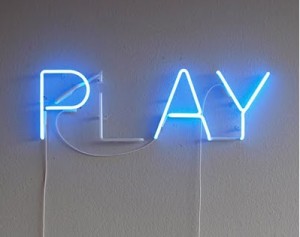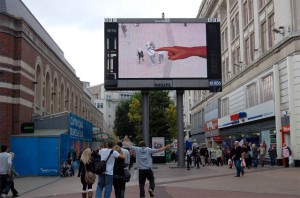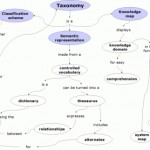The nation-state and the "marxist" ideological apparatuses connected with it (parties, cells, unions, and other…
Tutorial
Posted by Everdien on 2/15/10 • Categorized as All posts
 Did a tutorial with Henk last week. He keeps asking me – and is quite right to do so – to articulate why ‘play’ is relevant in contemporary art. How would art benefit from adopting play as a form? I have the intuitive notion that ‘play’ is more relevant than ever before, but how to map this intuition to the contemporary discourse? Decided on surveying the territory, developing a taxonomy of ‘play’ that may lead to some answers. Henk suggested I start the taxonomy by placing ‘play’ between ‘power’ and ‘desire’. Which is an interesting way to situate it, I’m sure.
Did a tutorial with Henk last week. He keeps asking me – and is quite right to do so – to articulate why ‘play’ is relevant in contemporary art. How would art benefit from adopting play as a form? I have the intuitive notion that ‘play’ is more relevant than ever before, but how to map this intuition to the contemporary discourse? Decided on surveying the territory, developing a taxonomy of ‘play’ that may lead to some answers. Henk suggested I start the taxonomy by placing ‘play’ between ‘power’ and ‘desire’. Which is an interesting way to situate it, I’m sure.
So I started the taxonomy by researching these terms, connecting them to the artists I am researching and writing blogs ‘some notes about desire‘ and ‘counteracting the control society’ and ‘create yourself‘.
Researching made me aware of one thing: I’m no philosopher. I like play because it is empirical: think of something, then try out if it works on the playground, then take what you have learned with you into real life. Not the philosophers ‘real life’ – mine, and yours.
I like play because it suits people that have ‘digital mindsets’. This is not a mindset that favours the discrete, the binary 0 and 1 opposition, but a mindset that likes fields of opportunities better than positions of certainty. Arjen Mulder describes this mindset in his book ‘on media theory’: people with ‘digital mindsets’ wonder why it is relevant to have one opinion, when there are so many that are available (page 182). The digital consciousness doesn’t take position but tries out different positions – plays with positions and opinions to see which will suit a given set of circumstances best.
I will add ‘technology’ to ‘power’ and ‘desire’ and start my taxonomy with that. Technology, I think, does more to shape our lives than all of philosophy combined. Am presently reading ‘Macht en Verlangen’ (Power and Desire), by Eric Bolle, 1981. Written before the age of the Internet, before the age of PC’s even. I talked to computers using punch cards in those days. The book describes Nietzche’s influence on Foucault, Deleuze and Guattari. Never mentions technology in its first 30 pages …. I have no real expectation of it mentioning technology at all. A lot of words about words and what things words are. Interesting but also rather futile: Foucault himself acknowledged that “what intellectuals have discovered under the weight of recent experiences (the revolt of ’68 in France) is this, that the masses do not need them at all to understand; they have a complete, clear and much better knowledge than intellectuals; and they can formulate this in an exellent way. But there is a power system that blocks, forbids and weakens their knowing and speaking. ” “The intellectuals themselves are part of this power system.” (page 28) The man must have been a romanticist at heart…… The romans – cynics to a man – believed that “bread and games” (or Bread and Circuses: panem et circenses) most accurately summed up ‘the masses’ main pursuits.
Art is boring. Play is fun. Modern art is a cryptogram for those in-the-know, it is artist’s art, speaking to the few. Play is accessible to many: even kids can play. Why not give critical thought (and action) an easy-to-digest form? Why not let go of the idea of an intellectual avant-garde showing the rest of the world the way? Open the doors for what was formerly called ‘the masses’ to formulate, create, explore? I like works that speak to me-in-the-street on an immediate and intuitive level. If the works are also computer-smart, so much the better!
 This pic is of a work named ‘hand from above’ and created by Chris O’Shea in 2009. Wonderful man-machine interactive game, he has more of these, see blog
This pic is of a work named ‘hand from above’ and created by Chris O’Shea in 2009. Wonderful man-machine interactive game, he has more of these, see blog
Wiki: In philosophy, “empiricism” is a theory of knowledge that asserts that knowledge arises from sense experience. Empiricism is one of several competing views about how we know “things”, part of the branch of philosophy called epistemology, or “the Theory of Knowledge”. Empiricism emphasizes the role of experience and evidence, especially sensory perception, in the formation of ideas, while discounting the notion of innate ideas (except in so far as these might be inferred from empirical reasoning, as in the case of genetic predisposition).
Gerelateerd:
-
Some notes about desire
-
Notes on taxonomy
Taxonomy is the practice and science of classification. Taxonomy (taxon = group) refers to the…
| « Chris O’Shea: audience | <-- previous post | next post --> | Formula » |
|---|








